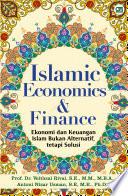Buku ini mengungkap bahwa Islamic Economics and Finance dibangun atas dasar Firman Allah Swt. dan Sunnah Rasulullah Saw., sehingga terjamin kehalalannya, keabsahannya, dan insya Allah Thoyib. Dalam pandangan Islam, sebagaimana banyak dijumpai dalam firman Allah Swt. bahwa ekonomi dan keuangan Islam tidak semata-mata diperuntukkan untuk umat Islam, akan tetapi untuk seluruh umat manusia.Keampuhan ekonomi dan keuangan Islam ini telah teruji, sebagaimana ketika terjadi krisis moneter pada tahun 1997, hanya bisnis Islam lah yang tetap berjaya, dan bahkan mampu menghasilkan laba usaha yang berlipat, sedangkan saat itu banyak bank-bank dan bisnis lainnya yang tumbang, bahkan terpaksa dilikuidasi.Kini pun dapat disaksikan bahwa di negara-negara yang mayoritas nonmuslim, telah tumbuh dan berkembang bank-bank, asuransi baru, serta bisnis lainnya bagaikan jamur di musim hujan. Demikian pula di kota-kota besar di beberapa negara tumbuh pula halal-mal, rumah makan halal, dan lain-lain.Buku ini mengurai dari teori ke praktik serta dapat menjawabberbagai masalah dan keraguan serta ketidaktahuan tentang keunggulan ekonomi dan keuangan Islam. Selain itu buku ini ditujukan untuk mahasiswa S1, S2, dan S3, serta praktisi yang menekuni dan mendalami ekonomi dan keuangan Islam.
Buku ini mengungkap bahwa Islamic Economics and Finance dibangun atas dasar Firman Allah Swt. dan Sunnah Rasulullah Saw., sehingga terjamin kehalalannya, keabsahannya, dan insya Allah Thoyib.










